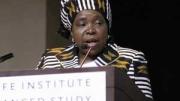Young teens in poor countries often buy cigarettes one at a time because they can’t afford a whole package. But that’s still enough to foster an addiction.
South African physician and former cabinet minister Nkosazana Dlamini-Zuma saw this as a major problem in her country, and it dawned on her: create a law requiring cigarettes to be sold in packs. “If [children] have to make a choice in the end between buying a DVD or going to the movies or buying tobacco, and tobacco is too expensive, they will dump it and go on to other things,” said Dlamini-Zuma, a guest speaker at this week’s “Governance of Tobacco in the 21st Century” conference, sponsored by Harvard School of Public Health (HSPH) and the World Health Organization (WHO).
The two-day conference, held at the Radcliffe Institute for Advanced Study, brought together global experts in public health, law, trade, and agriculture to address the public-health threat of increased tobacco use in undeveloped nations. In all, some 250 registrants from 35 countries convened to discuss a long list of steps to oppose major tobacco companies that market aggressively in undeveloped nations.
Smoking is on the decline in the developed world, but it is increasing rapidly in underdeveloped nations, where national and international tobacco companies have increased their marketing efforts, experts said. Today, about 900 million smokers live in developing nations, accounting for 70 percent of the global consumption of tobacco. Tobacco use is projected to cause 8.4 million deaths by 2020, and based on consumption patterns, the majority of those deaths likewise will occur in developing countries.
John Seffrin, CEO of the American Cancer Society, another conference speaker, called tobacco use the leading cause of premature death in the United States and the single most preventable cause of illness and premature death globally. “Tobacco killed 100 million people last century and it’s on course to kill a billion this century,” he said. “It’s an unprecedented carnage on human life. And if that isn’t bad enough, we have a highly profitable industry making sure that it happens.”
Dlamini-Zuma, chairperson of the African Union Commission, has been at the center of the fight to stop the spread of tobacco on her continent, pioneering legislation to stop tobacco sports-sponsorships, passing a groundbreaking law making it illegal to smoke in public places, and even asking South Africa’s deputy president to stop smoking his pipe in public. “Tobacco companies are working very to hard to make sure that what they lose in developed countries they gain in undeveloped ones,” Dlamini-Zuma said. “They are targeting the young, and also women.”
It is “strong leaders” like Dlamini-Zuma, said Matthew Myers—who runs The Campaign for Tobacco-Free Kids, a nonprofit that advocates policies to keep children from smoking—who are going to make the difference in fighting “Big Tobacco” at the highest level of government. Tobacco is not primarily a problem that is going to be solved in our medical healthcare systems, he added, but a problem of political will and social-norm change.
“We have a good news story, which is we know how to reduce tobacco use…we have no excuse for not succeeding, because we have models of success,” he said. “Raising the tobacco tax not only saves lives, but—where a small portion of that money is dedicated to reducing tobacco use and helping people avoid disease—we are able to sustain those programs not for one day, not for the limited period of donor interest or global funds, but on an ongoing and continuous basis.”
Although WHO director-general Margaret Chan praised recent developments in Russia, where President Vladimir Putin has proposed tough new tobacco legislation, and in Japan, where the government has sold some of its tobacco holdings, she also warned of a dark future if there is no immediate action. During the past 10 years, she said, smoking has decreased by about 10 percent in wealthy countries, but increased by around 18 percent in the developing world. She added: “Deadly products are being dumped on the poor.”
Chan also pointed out what she feels could be the most efficient way to control the spread of tobacco use: the Framework Convention on Tobacco Control (FCTC), adopted by the United Nations in 2005. Agreement on the treaty was “a milestone for public health, as it created international legal obligations to regulate tobacco,” she explained, adding that FCTC marked the first global treaty to regulate the marketing and trading of a product of mass consumption. “For a long time, the public-health community was, in effect, trying to topple a giant with a slingshot, relying largely on warnings about the health hazards of tobacco use, communicated in public-information campaigns,” Chan said. “In contrast, the treaty brought out the big gun. We need a big gun for Big Tobacco.”










